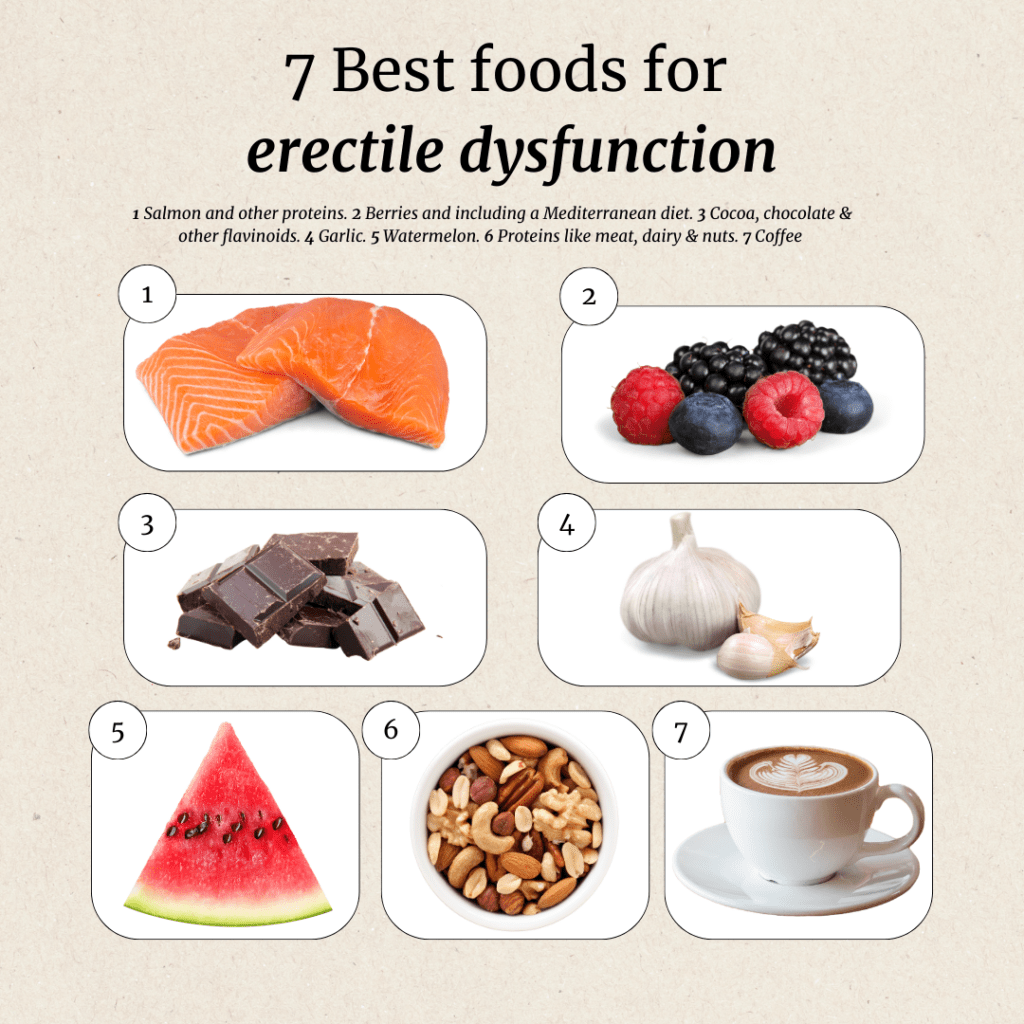Erectile dysfunction (ED) is a common condition that affects many men, particularly as they age. While medical treatments like sildenafil (Viagra) are effective, dietary changes can also play a significant role in managing ED. This guide will explore the best foods for combating erectile dysfunction and those to avoid, helping you make informed choices for better sexual health.
Understanding Erectile Dysfunction
Erectile dysfunction is the inability to achieve or maintain an erection sufficient for satisfactory sexual performance. It affects approximately 50% of men between the ages of 40 and 70 to varying degrees. While psychological factors can contribute, ED is often linked to physical causes such as:
• High blood pressure
• High cholesterol
• Diabetes
• Obesity
• Cardiovascular disease
The Link Between Diet and Erectile Function
A healthy diet can significantly impact erectile function by improving cardiovascular health, regulating blood sugar levels, and boosting testosterone production. The Mediterranean diet, rich in fruits, vegetables, whole grains, and healthy fats, has been shown to be particularly beneficial for treating ED.
Best Foods for Erectile Dysfunction
Berries
Strawberries, blueberries, and other berries are rich in flavonoids, which can reduce the risk of ED by up to 19%. These antioxidants improve blood flow and vessel health, crucial for achieving and maintaining erections.
Salmon and Fatty Fish
Rich in omega-3 fatty acids, salmon and other fatty fish can boost nitric oxide production in the body, improving blood flow to the penis. Aim for at least two servings of fatty fish per week.
Dark Chocolate
Dark chocolate contains flavonoids that can increase nitric oxide production and improve blood flow. Choose varieties with at least 70% cocoa content for maximum benefits.
Watermelon
This refreshing fruit contains citrulline, an amino acid that can have effects similar to ED medications on blood vessels. It may also boost libido.
Nuts
Walnuts, almonds, and other nuts are excellent sources of arginine, an amino acid that plays a crucial role in producing nitric oxide, a compound that helps relax blood vessels and improve blood flow. This enhanced circulation is important for maintaining healthy erectile function, as nitric oxide aids in the dilation of blood vessels in the penis, allowing for stronger and longer-lasting erections.
In addition to their high arginine content, nuts like walnuts and almonds are rich in vitamin E, an antioxidant that has been shown to improve sperm quality. Vitamin E helps protect sperm cells from oxidative damage, which can enhance fertility by improving sperm motility, count, and overall health.
Incorporating nuts into your diet can provide a range of benefits for sexual health, including better blood flow and improved fertility, making them a valuable addition to a balanced diet aimed at supporting reproductive health.
Leafy Greens
Spinach, kale, and other leafy greens are excellent sources of nitrates, which the body converts to nitric oxide. They’re also packed with vitamins and minerals essential for overall health.
Olive Oil
Extra virgin olive oil may help increase testosterone levels and improve blood flow. It is a key component of the Mediterranean diet, which has been linked to improved erectile function.
The healthy fats found in olive oil, particularly monounsaturated fats, support heart health and promote better circulation. Increased blood flow is essential for maintaining healthy erectile function, as it allows for proper blood supply to the penis. Additionally, research suggests that olive oil may positively influence testosterone levels, the hormone responsible for sexual drive and performance in men.
By incorporating extra virgin olive oil as part of a balanced, nutrient-rich Mediterranean diet, individuals may benefit from both improved vascular health and hormonal balance, both of which are crucial for preventing erectile dysfunction.
Garlic
Garlic, often praised for its numerous health benefits, contains a powerful compound called allicin, which has been shown to improve cardiovascular health. Allicin helps by relaxing blood vessels and promoting better circulation, which is essential for overall heart health and erectile function.
Improved blood flow is particularly important for men with erectile dysfunction (ED), as ED is often linked to poor circulation. By relaxing blood vessels, garlic can enhance the flow of blood to various parts of the body, including the penis, which is vital for achieving and maintaining an erection.
Regular consumption of garlic may also contribute to keeping arteries healthy and clear by reducing the buildup of plaque, lowering cholesterol levels, and improving blood pressure. This makes garlic an excellent natural option for supporting vascular health and potentially reducing the risk of ED over time.
Coffee
Caffeine, a natural stimulant found in coffee, tea, and some soft drinks, has been linked to improved cardiovascular health, which in turn benefits sexual function. Studies suggest that caffeine may improve blood flow by relaxing the arteries and muscles in the penis, allowing for better circulation. This enhanced blood flow is crucial for achieving and maintaining an erection.
Research has shown that men who consume moderate amounts of caffeine, typically equivalent to 2-3 cups of coffee per day (about 170-375 mg of caffeine), are less likely to experience erectile dysfunction. One theory is that caffeine triggers the relaxation of the penile arteries and cavernous smooth muscle, leading to an increase in blood supply to the area. This mechanism can help mitigate the vascular issues that often contribute to ED.
However, it’s important to note that excessive caffeine intake can have negative effects, including anxiety, restlessness, and increased heart rate, which may, in some cases, counteract these benefits. Therefore, moderation is key to achieving the potential benefits for erectile function.
Foods to Avoid for Better Erectile Function
While certain foods can help improve erectile function, others may contribute to ED. Here are some foods to limit or avoid:
• Processed meats
• Refined grains and sugars
• Excessive alcohol
• Full-fat dairy products
• Fried foods
• Soy products (may affect testosterone levels)
Certain foods can negatively affect erectile function by harming cardiovascular and hormonal health. Processed meats, full-fat dairy, and fried foods are high in unhealthy fats and cholesterol, leading to clogged arteries and poor circulation, which is crucial for achieving erections. Refined grains and sugars contribute to weight gain, insulin resistance, and inflammation, increasing the risk of ED-related conditions like obesity and diabetes. Excessive alcohol depresses the nervous system and reduces testosterone levels, both of which impair sexual performance. Lastly, while moderate soy intake is fine, excessive consumption may affect testosterone levels due to phytoestrogens, potentially contributing to erectile dysfunction. Limiting these foods can help support better blood flow and hormonal balance.
Lifestyle Changes to Complement Dietary Improvements
In addition to dietary changes, consider these lifestyle modifications to improve erectile function:
• Regular exercise
• Maintaining a healthy weight
• Quitting smoking
• Limiting alcohol consumption
• Managing stress
• Getting adequate sleep
When to Seek Medical Advice
While dietary changes can be beneficial, it’s important to consult a healthcare professional if you’re experiencing persistent erectile dysfunction. ED can sometimes be a sign of underlying health conditions such as cardiovascular disease or diabetes.
Your doctor can provide a proper diagnosis and recommend appropriate treatments, which may include:
• Medications (e.g., sildenafil, tadalafil)
• Lifestyle modifications
• Psychological counselling
• Other medical interventions
View Erectile Dysfunction Treatment Options
Sources
- NHS inform: https://www.nhsinform.scot/illnesses-and-conditions/sexual-and-reproductive/erectile-dysfunction-impotence/
- Cambridge University Hospitals NHS Foundation Trust: https://www.cuh.nhs.uk/patient-information/erectile-dysfunction-frequently-asked-questions/
- Gloucestershire Hospitals NHS Foundation Trust: https://www.gloshospitals.nhs.uk/documents/13793/Erectile_Dysfunction_Guideline.pdf
- Newcastle Hospitals NHS Foundation Trust: https://www.newcastle-hospitals.nhs.uk/services/urology/our-services/erectile-dysfunction-and-andrology/
- NHS My Way Diabetes: https://diabetesmyway.nhs.uk/resources/internal/erectile-dysfunction/
- Devon Formulary and Referral (NHS): https://southwest.devonformularyguidance.nhs.uk/referral-guidance/western-locality/urology/erectile-dysfunction-primary-care
- NHS UK (for medication information): https://www.nhs.uk/medicines/sildenafil-viagra/



